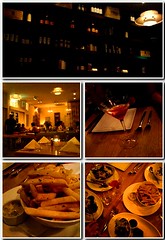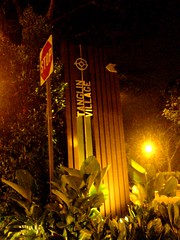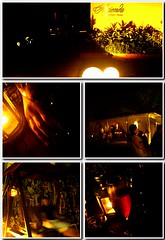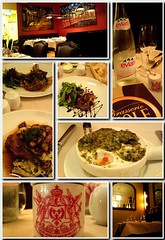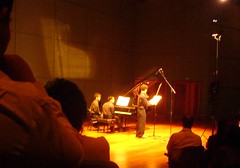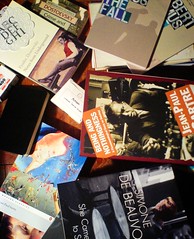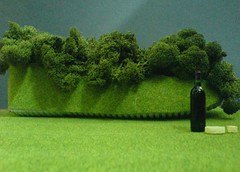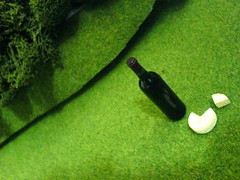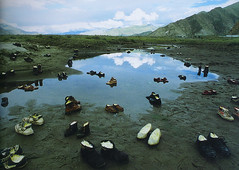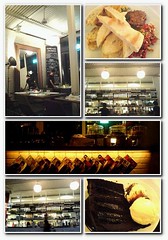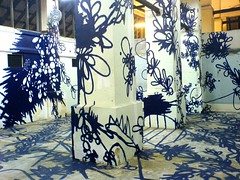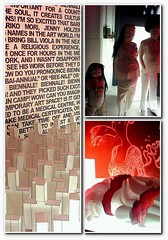Celebratory Meeting-Ups, Lenten Fasting and the Spirit

the repeated trips to Double Bay, Raffles City, for good fresh seafood with different folk,

the yummy homecooked braised pork dinners (with sharing and praying for dessert),

the homemade vodka cocktails, chicken liver pate, smoked salmon dip, "stonkingly-expensive" fig balsamic vinegar salad, ham pasta dinners (with hangover-inducing vodka jelly and Seventh Heaven's lovely coconut ice-cream and an unseeming amount of cable telly for dessert),

the catching up over steaming hot (or so it was on arrival but had become merely tepid when the B arrived half an hour later, having gotten very lost attempting to ford crocodile-infested rivers) fish head curry on rainy afternoons,
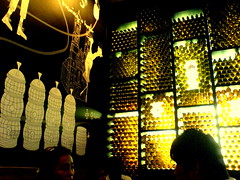

the sharing of good German nosh and beer at Brotzeit in honour of someone passing through and then a brief but good catch-up chat on the way home,

the sampling of passable dishes at 7atenine but with good company,

the generosity of friends (macarons! with lychee ganache! and hazelnut! and chocolate! with earl grey!),

and the dairy fridge-clearing (cream cheese cottage cheese sour cream poppyseed cheesecake-lets with vodka-soaked raisins), that the traditional Lenten fasting was not a visitor to this household.
2 For day after day they seek me out;As meaningless and boring (no fat, no meat, no alcohol, no treats? Oatmeal porridge and grilled unagi for brekkie again?) Lenten fasting per se might be, a daily log of our repenting of sins committed would be a far faster-acting irritant: O Lord, I'm sorry I did this. O Lord, I'm sorry, won't do it again. O Lord, oops I did it again...and that other thing I said I didn't know was a sin? I did that again too.
they seem eager to know my ways,
as if they were a nation that does what is right
and has not forsaken the commands of its God.
They ask me for just decisions
and seem eager for God to come near them.
3 'Why have we fasted,' they say,
'and you have not seen it?
Why have we humbled ourselves,
and you have not noticed?'
"Yet on the day of your fasting, you do as you please
and exploit all your workers.
4 Your fasting ends in quarreling and strife,
and in striking each other with wicked fists.
You cannot fast as you do today
and expect your voice to be heard on high.
5 Is this the kind of fast I have chosen,
only a day for a man to humble himself?
Is it only for bowing one's head like a reed
and for lying on sackcloth and ashes?
Is that what you call a fast,
a day acceptable to the LORD ?
6 "Is not this the kind of fasting I have chosen:
to loose the chains of injustice
and untie the cords of the yoke,
to set the oppressed free
and break every yoke?
7 Is it not to share your food with the hungry
and to provide the poor wanderer with shelter—
when you see the naked, to clothe him,
and not to turn away from your own flesh and blood? (Isaiah 58:2-7)
Yet there is much value to this somewhat impotent struggle against sin.
A majority of humans want to live rightly. Our definition what is "right" is either something that we have already attained or something we will attain in the future through effort. Only Christianity tells us from the outset that the standard of "right"-ness is perfection, God's definition of perfection at that (for he alone created the world and therefore alone defines right and wrong), and that we can't attain it no matter how hard we try, how severe our fasting, even if we give our whole lives for it.
It is an unusual thing that happens in the Christian believer when he first believes - he is at the same time both stricken with guilt and grief at his sin and despair at his inability to escape the accompanying judgement, and also bursting with celebratory joy at the salvic grace of an infinitely loving and merciful God who gave his Son that we might escape his judgement. This duality accompanies us through our lives as Christians as we struggle against our distrust and disobedience of God and his laws and is, in fact, evidence of our continuing to stand under cover of Christ's blood.
And it is the Spirit who works in us to accomplish this (far more useful than, say, inducing people to speak in unintelligible tongues, quack like ducks, fall over and scuff the church carpet). We cannot make any progress towards right living, however miniscule, without him:
(1) The Spirit alone clearly and fully convinces the heart of the evil and guilt and danger of the corruption, lust, or sin to be mortified. Without this conviction, or whilst it is so faint that the heart can wrestle with it or digest it, there will be no thorough work made. An unbelieving heart (as in part we have all such) will shift with any consideration, until it be overpowered by clear and evident convictions. Now this is the proper work of the Spirit: "He convinces of sin," John 16:8; he alone can do it. If men's rational considerations, with the preaching of the letter, were able to convince them of sin, we should, it may be, see more convictions than we do. There comes by the preaching of the word an apprehension upon the understandings of men that they are sinners, that such and such things are sins, that themselves are guilty of them; but this light is not powerful, nor does it lay hold on the practical principles of the soul, so as to conform the mind and will to them, to produce effects suitable to such an apprehension. And therefore it is that wise and knowing men, destitute of the Spirit, do not think those things to be sins at all wherein the chief movings and actings of lust do consist. It is the Spirit alone that can do, that does, this work to the purpose. And this is the first thing that the Spirit does in order to the mortification of any lust whatever, -- it convinces the soul of all the evil of it, cuts off all its pleas, discovers all its deceits, stops all its evasions, answers its pretences, makes the soul own its abomination, and lie down under the sense of it. Unless this be done all that follows is in vain.
(2) The Spirit alone reveals to us the fullness of Christ for our relief; which is the consideration that keeps the heart from false ways and from despairing despondency, 1 Corinthians 2:8.
(3) The Spirit alone establishes the heart in expectation of relief from Christ; which is the great sovereign means of mortification, 2 Corinthians 1:21.
(4) The Spirit alone brings the cross of Christ into our hearts with its sin-killing power; for by the Spirit are we baptised into the death of Christ.
(5) The Spirit is the author and finisher of our sanctification; gives new supplies and influences of grace for holiness and sanctification, when the contrary principle is weakened and abated, Ephesians 3:16-18.
(6) In all the soul's addresses to God in this condition, it has support from the Spirit. Whence is the power, life, and vigour of prayer? whence its efficacy to prevail with God? Is it not from the Spirit? He is the "Spirit of supplications" promised to them "who look on him whom they have pierced," Zechariah 12:10, enabling them "to pray with sighs and groans that cannot be uttered," Romans 8:26. This is confessed to be the great medium or way of faith's prevailing with God. Thus Paul dealt with his temptation, whatever it were: "I besought the Lord that it might depart from me." (John Owen, The Mortification of Sin)
ALMIGHTY and everlasting God, who hatest nothing that thou hast made, and dost forgive the sins of all them that are penitent: Create and make in us new and contrite hearts, that we worthily lamenting our sins, and acknowledging our wretchedness, may obtain of thee, the God of all mercy, perfect remission and forgiveness; through Jesus Christ our Lord. Amen. (The Collect, The First Day of Lent Commonly Called Ash Wednesday, The Book of Common Prayer)Then will come the Day when every man will be judged for what he has done in the flesh. At that time and in that glorious and dreadful day, all our praying and fasting behind closed doors, all our works done for the audience of One, all our puny seemingly futile pounding against the strong brick wall that is sin will not save us, but will stand as testimony that Christ has saved us, and that we will pass into a new world where our rebelliousness will trouble us no longer.
ALMIGHTY God, who sees that we have no power of ourselves to help ourselves: Keep us both outwardly in our bodies, and inwardly in our souls; that we may be defended from all adversities which may happen to the body, and from all evil thoughts which may assault and hurt the soul; through Jesus Christ our Lord. Amen.
(The Collect, Second Sunday in Lent, The Book of Common Prayer)
I Long For The Day
I long for the day when faith sees its goal,
When the things now unseen will be seen.
The day when my Saviour comes for his bride,
Whom his blood has washed spotlessly clean.
(Bryon Smith)
Double Bay Australian Dining and Bar
252 North Bridge Road
#01-22 Raffles City Shopping Centre
Tel: 6334 6530
Seventh Heaven
No. 10 Raeburn Park
#01-24/25/26
Singapore 08702
Tel: 6227 7787
Brotzeit
252 North Bridge Road
#01-17 Raffles City Shopping Centre
Singapore 179103
Tel: 6883 1534
Labels: All Given For Food: Bake and Cake, All Given For Food: Cheese, Mortification of Sin, Puritans








